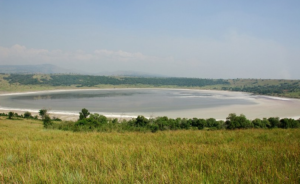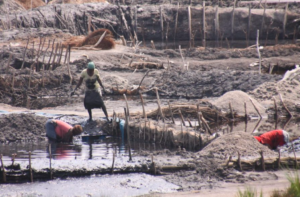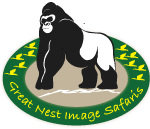Lake Katwe | Uganda Crater Lakes
Lake Katwe | Uganda Crater Lakes : also known as Katwe-Kikorongo craters are a group of volcanic craters and famous for its salt production. The volcanic field is about 210km2 whereas the individual craters vary in size with the largest 3km wide and 100m deep. Generally, these craters were formed as a result of violent volcanic explosions. As a result, they were caused by super-heated gas and steam but within no flow of lava.
 Many of these craters have developed into salt water lakes since they are filled with water from different craters with no outlets. There are mainly 3 crater lakes in Uganda. These include; Lake Katwe, craters on magnificent Kichwamba escarpment and Nandali Kasende in Kibale National Park. Lake Katwe found in Queen Elizabeth National Park is located in the south western part of Uganda in Kasese district. As a matter of fact, this crater lake is known for its salt production. The local salt miners use traditional methods to extract the rock salt directly from the lake which is dried and later sold out. A trip around this Lake will give you a great opportunity to learn about the salt water and also engage in interactions with the salt miners.
Many of these craters have developed into salt water lakes since they are filled with water from different craters with no outlets. There are mainly 3 crater lakes in Uganda. These include; Lake Katwe, craters on magnificent Kichwamba escarpment and Nandali Kasende in Kibale National Park. Lake Katwe found in Queen Elizabeth National Park is located in the south western part of Uganda in Kasese district. As a matter of fact, this crater lake is known for its salt production. The local salt miners use traditional methods to extract the rock salt directly from the lake which is dried and later sold out. A trip around this Lake will give you a great opportunity to learn about the salt water and also engage in interactions with the salt miners.
Why Lake Katwe is called a salty lake?
Lake Katwe is salty because it has got many water tributaries that bring in water however has got no outlet. During the dry season, there is a lot of evaporation that forms salt solution concentration of about 13.3% forming salt rocks.
Salt mining process at Lake Katwe
Salt mining at here is more favorable in the dry seasons January-March and July-September. The evaporation makes the saline water of Lake Katwe and concentration is increased by the workers. This is done by constructing salt pans at the margins of the Lake. When exposed to the bright sunshine, the brine pans contract rapidly in the process whereby large portions of concentrated salt are formed. Interestingly, this activity is conducted by both males and females.
 The females collect off the crusted salt formed on the surface which is normally filtered to make table salt. On the other hand, males scoop the salt blocks from the bottom of the lake which is usually at the shallow end of the lake. There are 3 types of salt extracted which include; highly crystalized salt which is best for human consumption. Unwashed salt which is used for tenderizing meat and beans locally during cooking and crude salt which is used as salt licks for cows.
The females collect off the crusted salt formed on the surface which is normally filtered to make table salt. On the other hand, males scoop the salt blocks from the bottom of the lake which is usually at the shallow end of the lake. There are 3 types of salt extracted which include; highly crystalized salt which is best for human consumption. Unwashed salt which is used for tenderizing meat and beans locally during cooking and crude salt which is used as salt licks for cows.
How dangerous is salt mining?
This activity is extremely dangerous to both women and men since it is toxic and affects the reproductive system of humans. In fact, it leads to impotence and barrenness among both sexes. Nevertheless, in order to avoid this women apply flour in the private parts to avoid the toxic water from entering them. Besides, the males put on condoms to avoid being affected too. In addition, the bad smell from the evaporating saline water also affects their health. However, since it’s there only source of income they do bear with these challenges so as to sustain their families and meet their basic needs.
Other challenges
They do get less income from this activity since there are other salt lakes discovered in other parts of the country. Therefore, in order to increase their source of income they do engage in craft making. These are usually displayed along the roadsides which you can buy from them as a way of supporting them.
Are their animals seen around Lake Katwe?
Yes, animals such as elephants are seen around the salt licks which constituent their diet. In places where the salt licks are hard, elephants will dig into the termite anthills. These actually contain salt red soils which they feed on.
Other activities to do while at Lake Katwe
- Craft making
- Culture
- Visit the local’s community towns to learn more about their life styles.
- Vegetation and animals which are seen along the way.
- Visit Queen Elizabeth National Park.
Where to stay while at Lake Katwe?
- Hippo hill lodge
- Forest Hog Safari Camp
- Tembo safari Lodge
How do I get to Lake Katwe?
While in Queen Elizabeth National Park you will be accompanied by a tour guide. Here, you will have a view and interaction with the salt miners.







https://waterfallmagazine.com
I was suggested this blog via my cousin. I’m not certain whether or
not this publish is written through him as nobody
else recognise such specified approximately my trouble.
You’re incredible! Thank you!